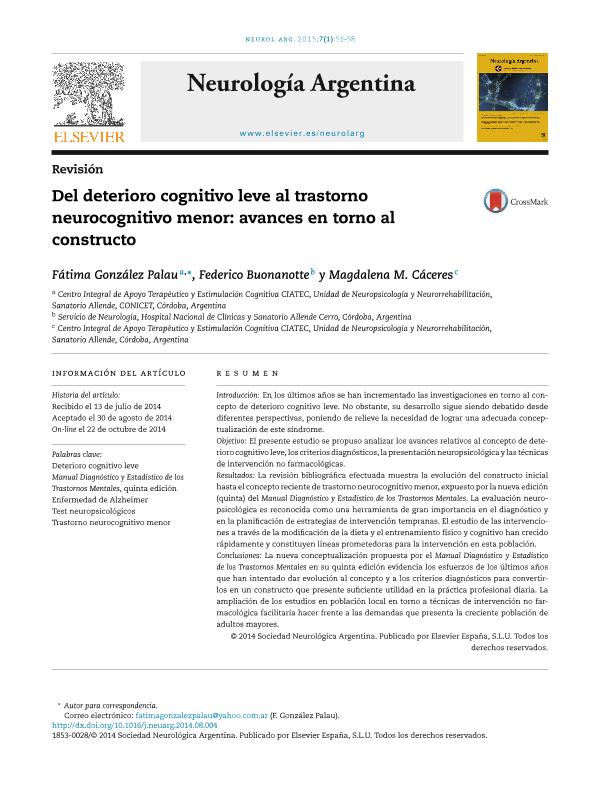Mostrar el registro sencillo del ítem
dc.contributor.author
González Palau, Fatima

dc.contributor.author
Buonanotte, Federico
dc.contributor.author
Cáceres, Magdalena M.
dc.date.available
2018-07-03T14:17:21Z
dc.date.issued
2015-01
dc.identifier.citation
González Palau, Fatima; Buonanotte, Federico; Cáceres, Magdalena M.; Del deterioro cognitivo leve al trastorno neurocognitivo menor: Avances en torno al constructo; Elsevier; Neurologia Argentina; 7; 1; 1-2015; 51-58
dc.identifier.issn
1853-0028
dc.identifier.uri
http://hdl.handle.net/11336/50998
dc.description.abstract
Introducción: En los últimos años se han incrementado las investigaciones en torno al concepto de deterioro cognitivo leve. No obstante, su desarrollo sigue siendo debatido desde diferentes perspectivas, poniendo de relieve la necesidad de lograr una adecuada conceptualización de este síndrome. Objetivo: El presente estudio se propuso analizar los avances relativos al concepto de deterioro cognitivo leve, los criterios diagnósticos, la presentación neuropsicológica y las técnicas de intervención no farmacológicas. Resultados: La revisión bibliográfica efectuada muestra la evolución del constructo inicial hasta el concepto reciente de trastorno neurocognitivo menor, expuesto por la nueva edición (quinta) del Manual Diagnóstico y Estadístico de los Trastornos Mentales. La evaluación neuropsicológica es reconocida como una herramienta de gran importancia en el diagnóstico y en la planificación de estrategias de intervención tempranas. El estudio de las intervenciones a través de la modificación de la dieta y el entrenamiento físico y cognitivo han crecido rápidamente y constituyen líneas prometedoras para la intervención en esta población. Conclusiones: La nueva conceptualización propuesta por el Manual Diagnóstico y Estadístico de los Trastornos Mentales en su quinta edición evidencia los esfuerzos de los últimos anos ˜ que han intentado dar evolución al concepto y a los criterios diagnósticos para convertirlos en un constructo que presente suficiente utilidad en la práctica profesional diaria. La ampliación de los estudios en población local en torno a técnicas de intervención no farmacológica facilitaría hacer frente a las demandas que presenta la creciente población de adultos mayores.
dc.description.abstract
Introduction: In the last years the number of studies related to the concept of mild cognitive impairment has increased. However, this concept is still discussed from different perspectives. This highlights the necessity of a suitable conceptual approach to this syndrome. Objective: The present study aims to analyze the developments related to the concept of mild cognitive impairment, the neuropsychological presentation and the psychosocial interventions strategies. Results: This study shows the development from the initial concept of mild cognitive impairment to the recent concept of mild neurocognitive disorder proposed by the new edition (5th) of The Diagnostic and Statistical Manual of Mental Disorders. The neuropsychological assessment is identified as an instrument of high importance in the diagnosis and in the design of early intervention strategies. The study of diet modification and of the physical and cognitive training interventions has increased and constitutes promising lines for the intervention in this population. Conclusions: The new concept proposed by The Diagnostic and Statistical Manual of Mental Disorders, 5th edition, demonstrates the efforts of the last years to make progress in the concept and in the diagnostic criteria in order to give them utility for professional practice. The development of local studies around psychosocial intervention strategies would facilitate to face the demands that present the increasing population of older adults.
dc.format
application/pdf
dc.language.iso
spa
dc.publisher
Elsevier

dc.rights
info:eu-repo/semantics/openAccess
dc.rights.uri
https://creativecommons.org/licenses/by-nc-sa/2.5/ar/
dc.subject
Deterioro Cognitivo Leve
dc.subject
Manual Diagnóstico y Estadístico De Los Trastornos Mentales
dc.subject
Enfermedad de Alzheimer
dc.subject
Test Neuropsicológicos
dc.subject
Trastorno Neurocognitivo Menor
dc.subject.classification
Psicología

dc.subject.classification
Psicología

dc.subject.classification
CIENCIAS SOCIALES

dc.title
Del deterioro cognitivo leve al trastorno neurocognitivo menor: Avances en torno al constructo
dc.title
From mild cognitive impairment to mild neurocognitive disorder: Progression of the clinical construct
dc.type
info:eu-repo/semantics/article
dc.type
info:ar-repo/semantics/artículo
dc.type
info:eu-repo/semantics/publishedVersion
dc.date.updated
2018-07-03T13:53:38Z
dc.journal.volume
7
dc.journal.number
1
dc.journal.pagination
51-58
dc.journal.pais
Argentina

dc.journal.ciudad
Ciudad Autónoma de Buenos Aires
dc.description.fil
Fil: González Palau, Fatima. Consejo Nacional de Investigaciones Científicas y Técnicas; Argentina. Sanatorio Allende. Unidad de Neuropsicología y Neurorehabilitacion; Argentina
dc.description.fil
Fil: Buonanotte, Federico. Sanatorio Allende. Servicio de Neurologia; Argentina
dc.description.fil
Fil: Cáceres, Magdalena M.. Sanatorio Allende; Argentina
dc.journal.title
Neurologia Argentina
dc.relation.alternativeid
info:eu-repo/semantics/altIdentifier/doi/https://dx.doi.org/10.1016/j.neuarg.2014.08.004
dc.relation.alternativeid
info:eu-repo/semantics/altIdentifier/url/https://www.sciencedirect.com/science/article/pii/S1853002814000901
Archivos asociados
